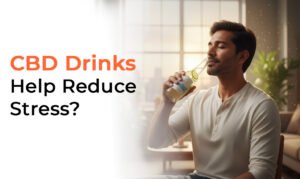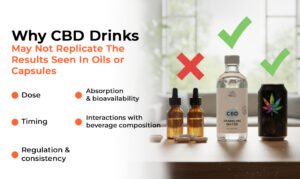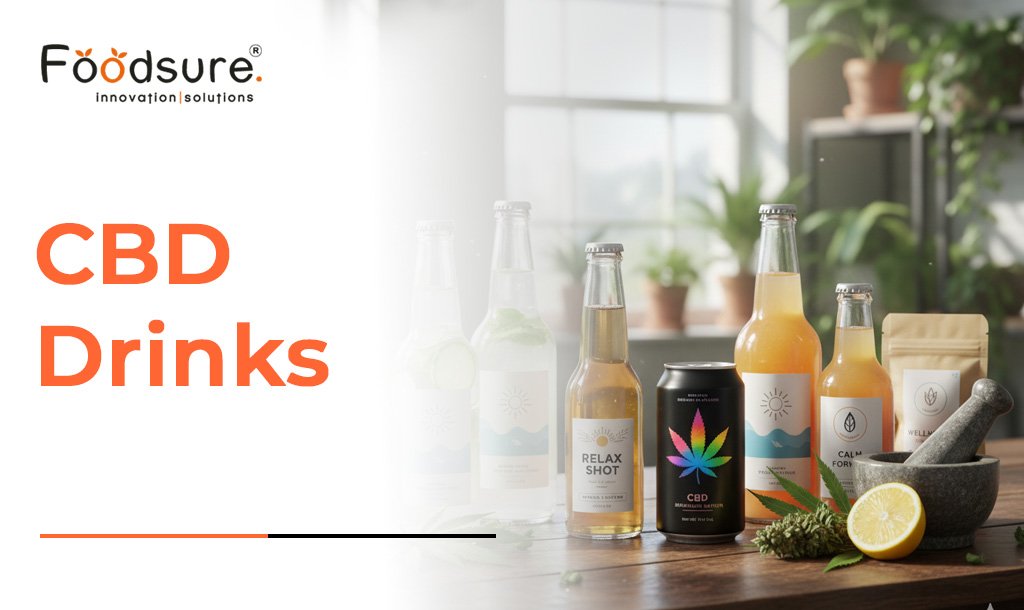Let’s be honest, when a beverage category goes from niche to almost every hip café menu in under five years, you want to know if it is real. CBD wants to relieve stress, calm you down, and put you in a good mood. But here is the truth: the science is interesting, the business is working, and to be frank, you will leave with more questions than answers. Let’s intelligently do this: what are these drinks, do they work, and what does any of this mean for you if you’re thinking about getting into the CBD business? 
What do we mean by “CBD drinks”?
When I refer to CBD drinks, I’m thinking of drinks that include cannabidiol (CBD), which is usually a derivative of hemp, which isn’t psychoactive. This could also include water, tea, some sparkling or non-alcoholic drinks, or even a “mocktail” type of drink or a functional beverage that claims to promote relaxation or help reduce stress, or support improved mood.
So, when you think about the claims associated with CBD drinks and stress, those are an extrapolation, put on by the marketing or poor information from the actual evidence. But there is a base of science around CBD more broadly (non‑drink forms).
What the science says: CBD and stress/anxiety
Here’s why people take CBD for stress:
- It interacts with the body’s endogenous cannabinoid system, which is implicated in stress, fear, and homeostatic aspects. CBD is shown to inhibit an enzyme (FAAH) to breaks down anandamide to increase the endogenous tone of cannabinoids in the brain.
- It appears to modulate serotonin receptors (especially 5-HT1A), which is a known common pathway with classical anti-anxiety medications.
- It has been shown to modulate neuroinflammation, oxidative stress, and certain models respond to hormone (cortisol) stress.
These mechanisms lend some plausible biological support. But biology = possibility, not proof.
Clinical/human evidence: promising but limited, mixed
Here’s what we do know from human trials and observational data.
What supports it
In people with anxiety or stress, small open‑label trials have shown reductions in anxiety over weeks using CBD oil or full‑spectrum preparations. Studies with induced stress (public speaking, lab stressors) show that when taken orally, CBD is affected by first-pass metabolism, so only a small amount gets into systemic circulation. Also, regulatory and quality control issues come to mind, as many consumer products containing CBD may not have the amount actually contained, may be contaminated, and/or may have THC in the product without notice/intent.
So yes, there are consistent cues and potential, but nothing more than that to confirm, “CBD drinks cure stress,” or “anxiety,” and a high percentage claim it helps. For example, in one survey, 37.5 percent said they used CBD for stress, and 92.2 percent of those reported reduced stress. So there is a signal in the data, but not conclusive proof.
What raises caution/counterpoints
- Many controlled trials show no effect or inconsistent effects. In one systematic review of 15 RCTs, 60 percent reported no anxiolytic benefit from a single dose of CBD for stress or anxiety triggers.
- In some trials, higher doses or certain dose ranges were less effective, or even counterproductive (anxiety increase). There seems to be a “sweet spot” rather than “more is better.”
- A study looked at expectancy effects, telling people they got CBD when they didn’t, and found that belief alone changed physiological markers. In other words, placebo and belief play a big role.
- Most studies were short (single dose or weeks), with small sample sizes, in healthy volunteers. Long-term safety and effects in high-stress populations are less well known.
- Bioavailability is a practical hurdle. Oral CBD suffers from first‑pass metabolism, so only a small amount will reach systemic circulation.
- Regulatory and quality control issues: many commercial CBD products may be inaccurate in dose, contain contaminants, or have unexpected THC content.
- So yes, there is consistent evidence and promise, but just not enough to say “CBD drinks treat stress.”
Why CBD drinks may not replicate the results seen in oils or capsules
Let’s get practical. Even if CBD can help with stress in some people, turning that into a drink has hurdles.
- Dose: Most positive trials used hundreds of milligrams (e.g., 300, 400, 600 mg). A typical CBD drink on the market might contain 5-50 mg. That’s orders of magnitude lower.
- Absorption & bioavailability: Liquids can help absorption, but the matrix, food effects, how quickly you drink it, and stomach pH all mess with how much CBD actually reaches your bloodstream. So a drink might deliver less “active” substance.
- Timing: The peak effect of orally ingested CBD (oil/vape/capsules) usually occurs around 1-4 hours after consumption. Drinking the beverage fast, or together with food, can delay or reduce its effect.
- Interactions with beverage composition: Things like sugar, carbonation, acidity, and herbs could interact, positively or negatively, to affect absorption/metabolism.
- Regulation & consistency: If the dose of CBD is not a regulated/consistent amount, users cannot expect results consistently.
So what this really means is: even if the underlying CBD molecule is helpful, a “drink format” might not deliver enough or a reliable dose to replicate effects seen in controlled trials.
When CBD drinks might help, and when they likely won’t
| Scenario | Likely helpful | Less likely helpful |
| Low-grade, everyday stress (mild anxiety, overthinking) | Possibly, if the dose is high enough, quality is good, and consumer expectations align | For severe chronic stress or clinical anxiety disorders |
| Occasional use (once in a while) | More plausible, as acute dosing is simpler to manage | When a daily reliable effect is needed |
| As part of a broader stress-management toolkit (sleep, diet, therapy) | Better chance of meaningful benefit | Using it as the sole or relied-upon intervention |
| High-dose CBD drink with verified dose and absorption tech | More likely to approach a clinically meaningful effect | Throwaway low-dose “CBD soda” marketed with hype |
What benefits might be realistic
If a CBD drink works (for you or someone), the benefits are more likely subtle, not dramatic:
- It may take the edge off tension or irritability.
- It could help if you’re in a mildly stressful situation (e.g. presentation, a social event).
- It might help with calm focus, not drowsy sedation.
- If part of a routine, it could offer marginal improvements in sleep or resilience over time.
So it’s not a magic elixir, but more like an optional tool.
Business/Market Insight (From Brand Perspective)
If you’re thinking of launching a CBD stress drink:
- Transparency & lab testing are your best differentiators
- You’ll need to navigate a shifting regulatory landscape
- Start with moderate doses + clean formula rather than extreme potency
- Combine CBD with adaptogens or calming herbs (if legal) to boost perceived effect, but test carefully
- Be conservative in your claims, don’t promise clinical cures
- Consumer demand is growing: brands like Vena, Skip, Recess, etc. are pushing CBD drinks as “wellness beverages.”
Conclusion: Do CBD drinks “help reduce stress”?
Yes, they may. But the caveats are substantial.
Research is indicating that CBD indeed has real potential as an anxiolytic or stress-reducer, but only under conditions (dose, formulation, timing) that many drinks may not meet. Due to insufficient testing of CBD drinks, these claims remain unsubstantiated.
If you are creating a brand or considering a drink option, consider it an accessory, not a guaranteed remedy. With smart formulation, transparency, and clear consumer education, they may carve out a niche. But overpromise, and you’ll lose credibility. If you are planning to launch your Beverage brand, just give us a call at +91 8130404757. Get all the information and services you need to make your brand the first choice for all. Book your free consultation now.
FAQs
- Does CBD actually help with stress?
Answer – In addition to reducing seizures, recent studies suggest that CBD may be effective for reducing stress, anxiety, pain, sleep problems, arthritis, depression, migraines, and headaches.
- Are CBD drinks actually calming?
Answer – Some proponents may suggest that CBD beverages help to relieve anxiety or reduce pain and inflammation. However, there is not currently much evidence to suggest that CBD drinks possess these benefits.
- How long until CBD helps anxiety?
Answer – Certain types of CBD oil may have effects on anxiety symptoms almost immediately, and, on the other hand, some forms may take effect after 30 minutes to 2 hours have elapsed. Your provider or pharmacist can assist you in selecting the ideal form of CBD for your treatment approach to anxiety symptoms.
- In what ways can Foodsure help my beverage brand stand out?
Answer – We help brands formulate smarter, from clean labels and functional ingredients to taste, stability, and scale. Whether you’re launching or improving, we build products people want to drink again.

